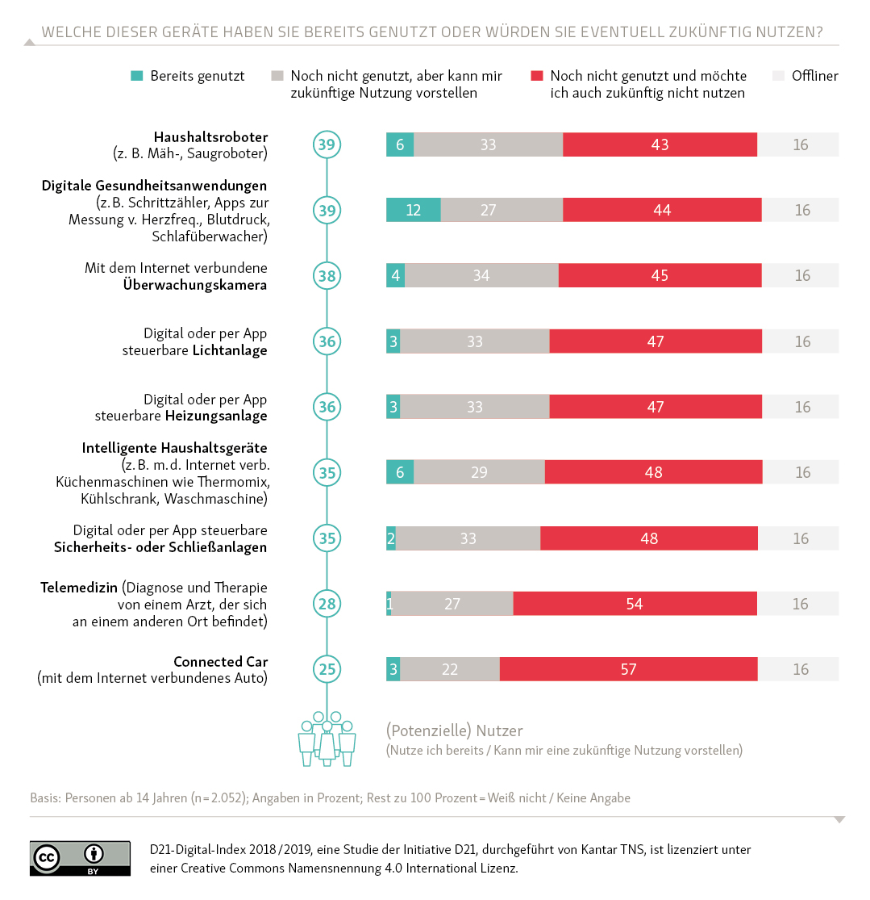According to the German Federal Ministry of Health, the advancement of e-health is the key to successfully updating healthcare provision. The IT sector is setting the pace through innovation, and it is up to the healthcare industry to keep up. But that is far from easy, as the findings of the D21 Digital Index show: e-health continues to be a niche topic regarded as ‘just for tech enthusiasts’.
What are the different viewpoints on e-health? Are all stakeholders trying to achieve the same goal? Or are the various viewpoints and approaches so different that progress is doomed to come to a halt?
Viewpoint 1: the public
The public’s viewpoint is an important one, as people are the end consumers and beneficiaries of e-health. Almost 20,500 people took part in the 2018/2019 D21 Digital Index survey, answering questions on a wide range of digital topics, including their acceptance and use of digital healthcare applications such as telemedicine and apps that measure heart rate and blood pressure. The findings clearly show that e-health continues to be a niche topic regarded as ‘just for tech enthusiasts’. One in three respondents was open to e-health in principle, and one in four could imagine the use of telemedicine, but only a tiny minority of people are actually using this technology already. A number of reasons are given for not doing so: half of respondents do not see a sufficient benefit, 35 percent cite high costs, and 36 percent have concerns over data privacy.
Viewpoint 2: healthcare providers
Healthcare providers see e-health as a huge opportunity. The number of elderly and chronically ill people is growing, while the availability of medical staff is limited, especially in rural areas. Digital applications can help to minimize this deficit. But healthcare providers in Germany are facing two major challenges: the need to balance budget restrictions and necessary investment, and patients’ concerns about data privacy, as mentioned above. According to the 2018/2019 D21 Digital Index, 81 percent of respondents regarded personal data relating to their health and illnesses as extremely sensitive information requiring the highest level of security. Accordingly, great importance is placed on data protection guidelines. Michael Rosenstock, Head of Sana Digital at Sana Kliniken AG, outlines a possible approach: “We have to clearly show how we are keeping the risks to the minimum possible, how meticulous we are when selecting new digital applications in healthcare, especially with regard to data security, and how much the benefits for the patients outweigh any potential drawbacks.”
Viewpoint 3: policymakers
Just like the healthcare providers, policymakers also believe that e-health has huge potential to improve patient care. But they are fully aware of the challenges mentioned above. In addition to legislative changes, such as the E-Health Act, policymakers hope to promote the topic of e-health by ensuring that digital applications are presented in a clearer and more attractive way. Karin Maag, spokesperson on healthcare policy for the CDU/CSU parliamentary group in the German Bundestag, believes that “particularly when it comes to healthcare policy, all those involved must work hand in hand to deal with the current challenges, and especially to highlight the benefits of digital applications. There remains a great need for more information and advice here, which we should endeavor to satisfy together.” This means moving the focus of attention onto the opportunities inherent in digitalization. The use of telemedicine can compensate for the shortage of rural doctors, for example, and reduce the burden on the ambulance service.
Viewpoint 4: the digital enablers
Other stakeholders within healthcare with a valuable viewpoint on e-health are the digital enablers, i.e. the companies that support healthcare providers with the process of digitalization and therefore have an interest in helping e-health to break through. How do these enablers manage the aforementioned challenges? What is their main focus? What are the best practices in Germany’s healthcare sector?
Using a real-world example, Meik Eusterholz, head of the healthcare industry business segment at management consultants UNITY, explains the advantages of the digital transformation for hospitals: “A digitally supported appointment process in which many aspects are automated enables hospitals to use key figures to manage this primary process. The required capital investment leads to time savings that increase the hospital’s economic efficiency in the long term. At the same time, patients benefit from this automated workflow through shorter waiting times and fewer cancellations.”
Peter Krause, head of healthcare sector sales at CHG-MERIDIAN AG, believes the journey is the reward: “Even small steps help our customers to achieve their objectives. The important thing is to get staff and patients involved in the journey toward the digital hospital, for example with successful smaller projects that can then be duplicated and expanded.”
Healthcare providers, policymakers, and digital enablers are clearly pursuing the same goal. The task now is to make a better case for e-health that is more attractive to users and patients, and to bring about a change in peoples’ perceptions.
The above-mentioned viewpoints are the outcome of CHG-MERIDIAN’s panel discussion held on April 9 at the DMEA fair. Find out more here.
Would you like to be there at CHG-MERIDIAN’s next healthcare event?
As part of the 2019 Hauptstadtkongress conference, the Customer Experience Day will take place in Berlin on May 22 and will feature speeches on the topic of ‘Digital transformation – from hype to implementation’. More information is available here.
Contact us!
Feel free to contact us in case of questions!
Frank Schöneberg
Vice President Public Sector & Healthcare Sales
- CHG-MERIDIAN AG
- Hans-Böckler-Str. 33
- 40476 Düsseldorf
- +49 211 55727-60
- +49 170 9813149
- [email protected]




